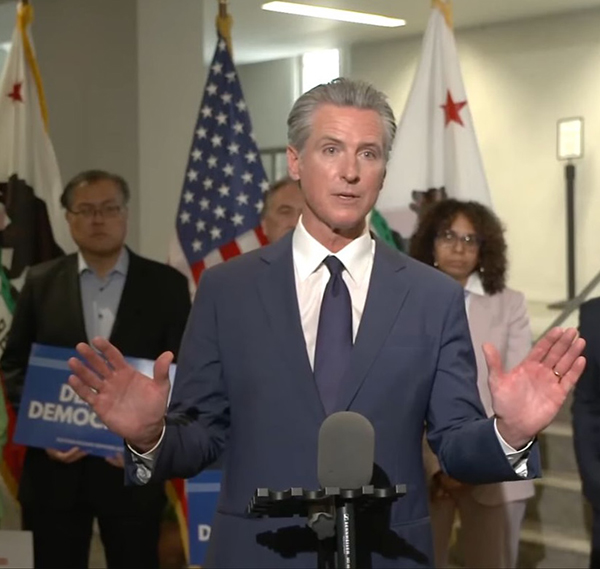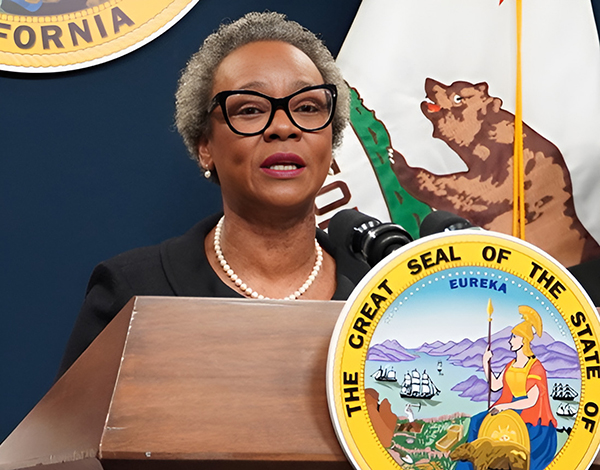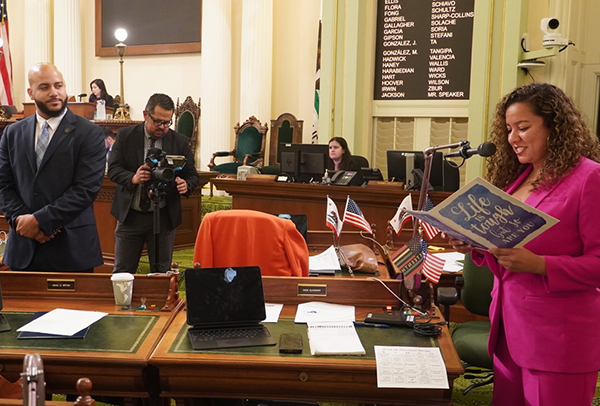Black caucus members support new redistricting maps

Gov. Gavin Newsom signs Assembly Constitutional Amendment 8, adopting a temporary congressional map to counteract potential gerrymandering efforts in Texas. Voters will decide the issue in a special election Nov. 4.
Photo by Antonio Ray Harvey
By Antonio Ray Harvey
Contributing Writer
SACRAMENTO — Democrats — with the support of the California Legislative Black Caucus — are gearing up to add five additional Democratic seats in the U.S. House of Representatives.
That move, legislative leaders say, counters partisan redistricting efforts in Texas.
Last week, the state Legislature passed Assembly Constitutional Amendment 8 which will appear on the ballot as Proposition 50 — the “Election Rigging Response Act” — in a special election set for Nov. 4. The bill gives Californians the chance to adopt a temporary congressional map favorable to Democrats.
Legislative Black Caucus Chair Sen. Akilah Weber Pierson, D-San Diego, stated that “California’s response is not one I take lightly” and the redistricting measures are about “defending our right to fair representation.”
“Californians have for far too long felt the consequences of decisions made far from our state, and we are now bearing the brunt of the Trump administration’s policies,” Weber Pierson said.
“Tariffs are driving up consumer prices, changes in health care policy are increasing costs and narrowing access, federal support for vital infrastructure is becoming increasingly unreliable, and cuts to our educational systems are limiting opportunities for some of our most vulnerable communities,” Weber Pierson added.
According to the Legislative Black Caucus, Black communities in California and across the country have been disproportionately harmed by the policies and funding reversals of the Trump administration.
Assemblywoman Rhodesia Ransom, D-Stockton, said during the floor debate Aug. 21 that it was necessary to pass bills to place Proposition 50 on the ballot to protect California.
“This is about citizens who are terrorized,” Ransom said. “With those being bullied, in need of someone to stand up, California is not going to sit down and be a bystander. The rules have been changed, and we have to act accordingly.”
All three Black members of California’s delegation to the U.S. House of Representatives U.S. Reps. Sydney Kamlager-Dove, D-Los Angeles, Lateefah Simon, D-Oakland, and Maxine Waters, D-Los Angeles, are not likely to be affected by the proposed redrawn congressional maps.
The 12-member Legislative Black Caucus was deeply involved in promoting redistricting efforts leading up to the final votes. The stood alongside their legislative colleagues voicing their support during legislative hearings and news conferences held around the state last week.
The caucus also declared in a letter that it stands in full solidarity with the redistricting effort after Newsom signed the bill last week.
“This is not simply about politics. It is about justice, fairness, and ensuring that the voices of Black Americans are not erased from the halls of power,” the letter said. “The California Legislative Black Caucus will continue to fight to protect the vote, defend the dignity of our communities, and uphold the promise of equality under the law.”
The debate in both houses of the State Legislature lasted about six hours before the measures passed with a super majority vote by the Democrats. Republican lawmakers, in the upper and lower houses, fought against Democrats’ plans, emphasizing that electoral maps had already been drawn by the public.
Some state Republican lawmakers, however, questioned President Donald Trump’s and Texas Gov. Greg Abbott’s intentions to add five seats in Texas before the 2026 midterm elections.
Assembly Minority Leader James Gallagher, R-East Nicholaus, said Trump was utterly mistaken to request partisan gerrymandering in Texas and other states.
“I have no problem saying that I think my president is wrong. I think he is wrong on this point,” Gallagher said.
Gov. Gavin Newsom’s legislative package includes three measures. Assembly Constitutional Amendment 8, which was authored by Assembly Speaker Robert Rivas, D-Salinas, and Senate President Mike McGuire, D-Healdsburg. That legislation allows state lawmakers to adopt a new congressional map.
Assemblywoman Cecilia Aguiar-Curry, D-Winters, and state Sen. Lena Gonzalez, D-Long Beach, authored Assembly Bill 604. It specifies that temporary congressional district maps would take effect if ACA 8 is approved by voters.
Senate Bill 280, authored by state Sen. Sabrina Cervantes, D-Riverside, along with Assemblywoman Gail Pellerin, D-Santa Cruz, establishes the procedures and funding for the November special election.
Proposition 50 would allow voters to temporarily approve the new maps drawn by the Legislature. It seeks to redraw the state’s congressional district maps for the 2026, 2028 and 2030 elections.
If voters reject Proposition 50, existing congressional districts maps will remain in place.
Proposition 50 also proposes that California’s 14-member Citizens Redistricting Commission will redraw congressional districts in 2031 following the 2030 Census.
The commission adopted the current congressional districts map on Dec. 27, 2021, for use in elections from 2022 through 2030.
Weber Pierson emphasized that the temporary redistricting proposal is designed to combat what she deems as President Trump’s interference with the 2026 mid-term election.
“If the Trump administration and Texas leaders succeed in their plan, they will solidify their ability to govern without answering for the real-world consequences of their policies,” Weber Pierson said.
Antonio Ray Harvey is a reporter for California Black Media.





